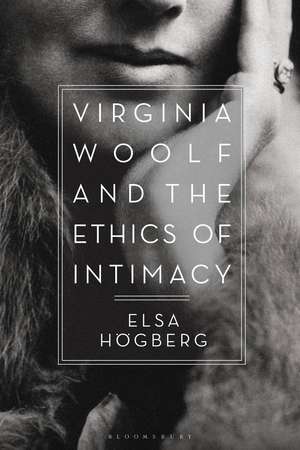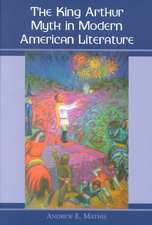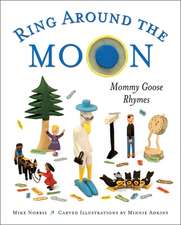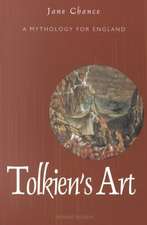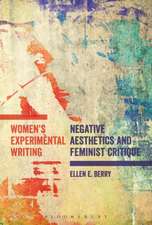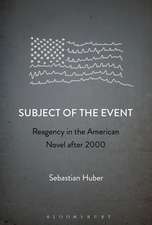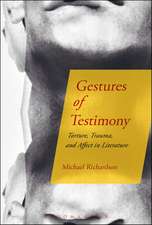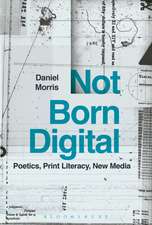Virginia Woolf and the Ethics of Intimacy
Autor Dr Elsa Högbergen Limba Engleză Paperback – 25 aug 2021
| Toate formatele și edițiile | Preț | Express |
|---|---|---|
| Paperback (1) | 217.82 lei 6-8 săpt. | |
| Bloomsbury Publishing – 25 aug 2021 | 217.82 lei 6-8 săpt. | |
| Hardback (1) | 598.52 lei 6-8 săpt. | |
| Bloomsbury Publishing – 5 feb 2020 | 598.52 lei 6-8 săpt. |
Preț: 217.82 lei
Preț vechi: 274.96 lei
-21% Nou
Puncte Express: 327
Preț estimativ în valută:
41.68€ • 42.100$ • 34.78£
41.68€ • 42.100$ • 34.78£
Carte tipărită la comandă
Livrare economică 26 martie-09 aprilie
Preluare comenzi: 021 569.72.76
Specificații
ISBN-13: 9781350237438
ISBN-10: 1350237434
Pagini: 248
Dimensiuni: 156 x 234 x 19 mm
Greutate: 0.35 kg
Editura: Bloomsbury Publishing
Colecția Bloomsbury Academic
Locul publicării:London, United Kingdom
ISBN-10: 1350237434
Pagini: 248
Dimensiuni: 156 x 234 x 19 mm
Greutate: 0.35 kg
Editura: Bloomsbury Publishing
Colecția Bloomsbury Academic
Locul publicării:London, United Kingdom
Caracteristici
Covers Woolf's major inter-war novels - Jacob's Room, Mrs Dalloway, To the Lighthouse and The Waves
Notă biografică
Elsa Högberg is a research fellow in English Literature at Uppsala University, Sweden.
Cuprins
AcknowledgementsAbbreviationsIntroduction: Towards an Ethics of Intimacy 1. Jacob's Room: Modernist Melancholia and the Eclipse of Primal Intimacy 2. "An inner meaning almost expressed": Introspection as Revolt in Mrs Dalloway 3. Post-Impressionist Intimacy and the Visual Ethics of To the Lighthouse 4. Chalk Marks: Violence and Vulnerability in The Waves Bibliography Index
Recenzii
Provides a compelling and uncommonly detailed examination of the ethical and political dimensions of Modernist interiority in Virginia Woolf's fiction.
This major new contribution to Woolf and modernist studies combines brilliant close readings of the novels with a sophisticated and searching theoretical framework. It opens up questions of intimacy and interiority, ethics and affect, and principles of non-violence, in highly original and compelling ways. Developing a model of an ethics of intimacy and politicising Woolf's modernist writing of interiority, it affords new ways of understanding the place of ethics and aesthetics in the charged context of the interwar years.
Intimacy itself is knowledge is the startling revelation of Virginia Woolf's writing, Elsa Högberg convincingly argues, in this stunningly insightful and truly timely new work, Virginia Woolf and the Ethics of Intimacy. Högberg recognises and lucidly delineates Woolf's importance for more recent developments in an emergent and compelling post-Levinasian ethics and aesthetics of intimacy evident in major late twentieth-century and twenty-first century feminist works such as Julia Kristeva's Intimate Revolt, Luce Irigaray's Sharing the World and Judith Butler's Frames of War. Like waters poured into one jar, Högberg places these thinkers in fluent and intimate dialogue with Woolf's writings-unfolding scintillating new readings of Jacob's Room, Mrs Dalloway, To the Lighthouse and The Waves and likewise reflecting back on the achievements of Kristeva, Irigaray and Butler-in order to clarify an emergent and radical ethics of intimacy that revises received understandings of autonomous subjectivity and subjects-in-process, of encounters with the other, of vulnerability and violence, of interiority and affect. If you think you understand what Woolf meant by her famous injunction 'Look within', then think again: Högberg will help you grasp anew the political and ethical radicality of that injunction. Pay full attention to this thrilling and urgent work of outstanding scholarship which makes possible a powerful ethical model of radical intimacy with a capacity for non-violent resistance to patriarchy, fascism and war, and also for a replenishing affective intensity, a reparative lyric jouissance by which we might begin to think peace into existence.
This major new contribution to Woolf and modernist studies combines brilliant close readings of the novels with a sophisticated and searching theoretical framework. It opens up questions of intimacy and interiority, ethics and affect, and principles of non-violence, in highly original and compelling ways. Developing a model of an ethics of intimacy and politicising Woolf's modernist writing of interiority, it affords new ways of understanding the place of ethics and aesthetics in the charged context of the interwar years.
Intimacy itself is knowledge is the startling revelation of Virginia Woolf's writing, Elsa Högberg convincingly argues, in this stunningly insightful and truly timely new work, Virginia Woolf and the Ethics of Intimacy. Högberg recognises and lucidly delineates Woolf's importance for more recent developments in an emergent and compelling post-Levinasian ethics and aesthetics of intimacy evident in major late twentieth-century and twenty-first century feminist works such as Julia Kristeva's Intimate Revolt, Luce Irigaray's Sharing the World and Judith Butler's Frames of War. Like waters poured into one jar, Högberg places these thinkers in fluent and intimate dialogue with Woolf's writings-unfolding scintillating new readings of Jacob's Room, Mrs Dalloway, To the Lighthouse and The Waves and likewise reflecting back on the achievements of Kristeva, Irigaray and Butler-in order to clarify an emergent and radical ethics of intimacy that revises received understandings of autonomous subjectivity and subjects-in-process, of encounters with the other, of vulnerability and violence, of interiority and affect. If you think you understand what Woolf meant by her famous injunction 'Look within', then think again: Högberg will help you grasp anew the political and ethical radicality of that injunction. Pay full attention to this thrilling and urgent work of outstanding scholarship which makes possible a powerful ethical model of radical intimacy with a capacity for non-violent resistance to patriarchy, fascism and war, and also for a replenishing affective intensity, a reparative lyric jouissance by which we might begin to think peace into existence.
